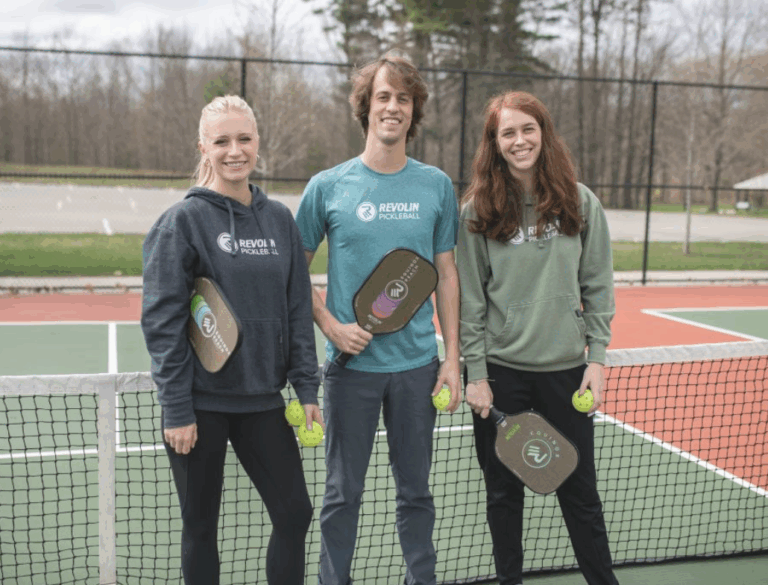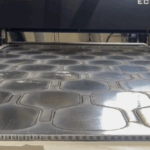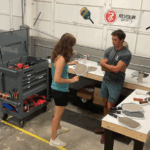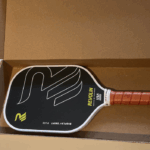
- Kim Kisner
- Business
- 10/14/2025
How Revolin Sports Is Working to Make Pickleball More Sustainable

Revolin Sports, a Holland, Michigan-based startup founded by siblings Hugh and Greta Davis, is aiming to change how sports equipment is made — starting with the fastest-growing sport in America: pickleball. The company is using renewable materials, energy-efficient manufacturing, and recyclable design to lower the environmental footprint of high-performance paddles.
SBN Detroit interviewed Hugh Davis, cofounder of Revolin Sports, about how sustainable materials, circular manufacturing, and local partnerships are reshaping the future of sporting goods manufacturing in Michigan and beyond.
Q: What first motivated you to build a sustainable paddle brand?
A: I started playing pickleball in high school and eventually started competing semi-professionally.
As a sponsored player, I kept noticing a pattern — paddles were breaking constantly. My friends’ paddles were breaking, too, so I began repairing them in my garage. That side hustle evolved into a deeper curiosity about how to make paddles better. I studied engineering at the University of Michigan, which gave me insight into materials and design, and I realized there was an opportunity to build something higher performing and better for the planet.
Ultimately, my vision was to revolutionize equipment by using natural fiber and renewable linens – that’s where the name Revolin comes from.
Between 2015 and 2020, my sister and I built and tested a few hundred prototypes, experimenting with new combinations of renewable materials like flax and hemp. Eventually, we landed on a formula that delivered superior performance with less vibration and weight — and dramatically reduced emissions. That became the foundation for Revolin, which we launched in 2020 with the world’s first 98% reduced-emission flax paddle.
Q: Most high-performance paddles today use carbon fiber, which has a large carbon footprint. How do you assess and reduce that impact?
A: Most paddles are made from carbon fiber or fiberglass, and those materials definitely have value. They’re lightweight, stiff, and durable. But they’re also petroleum-based, energy-intensive to produce, and nearly impossible to recycle.
We evaluate each material’s embodied emissions — how much carbon it takes to produce — and calculate the footprint per paddle based on the exact quantities used. Our data shows a 50-75% reduction in greenhouse gas emissions per unit compared to traditional paddles.
We also manufacture in the U.S. using primarily U.S.-sourced materials. That reduces transportation emissions and gives us control over our process, from sourcing to final product. Most of our emission reduction comes from our material choices — how we layer and combine them to improve both environmental impact and performance.

Q: You use BioFLX™ (hemp/flax composites) and LavaFLX™ technologies. What are those materials, and how did you develop them?
A: BioFLX™ refers to our biocomposite made from hemp and flax — two plants that grow tall and fast and contain some of the strongest natural fibers on Earth. We extract, weave, and layer those fibers in specific orientations, then press them together using a low-energy resin system. The result is a lightweight, rigid panel that reduces vibration and is fully recyclable.
LavaFLX™ works similarly but uses fibers derived from volcanic rock. The rock is melted, purified, and extruded into filaments thinner than human hair. It’s less energy-intensive to process than carbon fiber and easier to recycle, while offering exceptional power and spin.
We also combine the two to create BioFLX™ Plus — a hybrid that balances strength, elasticity, and environmental benefits. We’ve patented how we layer and weave these materials, and we’re already exploring how to use them in other industries like skis, snowboards, and paddleboards.
Q: Where do you see the biggest energy or waste inefficiencies in paddle production?
A: Two main areas: waste and durability.
In traditional sporting goods manufacturing, roughly one-third of materials end up as scrap. A lot of that comes from cutting patterns or using oversized molds. Most of the industry’s production is overseas, so there’s also significant energy and shipping waste.
We focus on small-batch production to minimize scrap and leverage leftover material wherever possible. Then there’s product lifespan. Some players go through a dozen paddles a year because they’re not built to last. We design ours for durability — and we are piloting a program to refurbish and recycle paddles at end-of-life.
Q: What steps have you taken to make your packaging more sustainable?
A: We keep packaging simple and circular. All of it is made from recycled cardboard that’s fully recyclable again. We print with algae-based inks, which have a lower footprint and fewer toxins than petroleum-based inks. And we use minimal packaging — no excess plastic or unnecessary filler.
Q: How does your paddle recycling program work?
A: We recently launched a pilot program with our Rise paddle, which was designed to be nearly 100% recyclable. Once the grip wrap is removed, we can grind the rest of the paddle and turn it into pellets for injection molding or even filament for 3D printing.
Customers who return their paddles get a discount on a new one, and we reuse the material to create other products. The program is still in its beta phase, but we’re collecting paddles and testing processes now. Within the next year or two, we plan to scale it into a full circular system.
Q: What are the biggest challenges you face?
A: Cost is definitely one. Our materials are unique and sourced from small, innovative suppliers. Building everything in the U.S. adds cost too, but it allows us to control quality, innovate quickly, and maintain transparency.
Availability can also be challenging. These materials are newer, niche, and sometimes hard to find in the right weights or thicknesses.
Q: How do consumers respond to the higher price point?
A: It depends. Some buyers come to us because of sustainability, others because of performance. Once players feel the paddle — the lack of vibration, the control, the extra spin — they recognize the performance value. It’s not just a sustainable paddle; it’s a better paddle.
We’ve worked hard to keep pricing competitive without passing our higher costs directly to consumers. And once people learn about our mission and how thoughtfully the product is made, it often seals the decision for them.
Q: What lessons or advice would you share with other Michigan-based start-ups looking to develop products that are more sustainable?
A: The most important step is just starting. For us, it began with designing a recyclable product — thinking about circularity from the beginning. Once you set up your design and material systems, it becomes easier to build the recycling and recovery process around them.
Next, partnerships matter. We’ve worked with organizations like Padnos, a major Michigan-based recycling company, to understand what they need from us to recycle effectively. Collaboration is essential — no one builds a circular system alone.
And finally, sustainability can start small. Beyond our materials, we partner with One Tree Planted (buy a paddle, plant a tree) and host local initiatives like Earth Day tournaments and community cleanups. Those efforts make a direct impact and show that sustainability isn’t just a business practice — it’s a mindset – and anyone can do it.
Be sure to subscribe to our newsletter for regular updates on sustainable business practices in and around Detroit.
Kim Kisner
- All
- Business
- Community
- Education
- Events

Unique Monique Scented Candles, a Detroit-based business founded by Monique Bounds., aims to produce candles and household products with clean ingredients and local supply chains. What began as a personal hobby during college has evolved into a full-time venture producing coconut oil and soy-based candles made with essential oils and locally sourced materials. SBN Detroit interviewed Bounds about launching a sustainable product line, sourcing challenges in Michigan, and...

Eastern Market Partnership, in collaboration with the City of Detroit’s Office of Sustainability Urban Agriculture Division, has announced $240,000 in grant funding to support Detroit-based farmers and farmer collectives. The grants will advance food access, climate education, sustainable land use, and economic opportunity, with priority given to Black- and Indigenous-led farms, youth-led initiatives, and projects rooted in historically disinvested neighborhoods. The recipients – ranging from cooperatives and community...

Citizen Robotics is a Detroit-based nonprofit that advances the use of robotics and digital manufacturing in residential construction, focusing on improving productivity, sustainability, and long-term affordability. Best known for its early work in 3D-printed housing, it explores how alternative construction methods and new financial models can reduce material waste, lower lifetime operating costs, and enhance the resilience of homes. SBN Detroit interviewed Tom Woodman, founder and president of...







